For efficient radiant floor heating, you'll want to choose materials that conduct and distribute heat effectively. The top 5 options are concrete, engineered hardwood, ceramic tile, natural stone, and vinyl flooring. Concrete offers high thermal mass and durability, while engineered hardwood provides stability and moisture resistance. Ceramic tile excels in heat conductivity and is ideal for high-moisture areas. Natural stone boasts excellent thermal properties and longevity. Vinyl flooring is a budget-friendly choice with good heat conduction. Each material has unique benefits, from customizable appearances to easy maintenance. Exploring these options further will help you make the best choice for your home's needs.
Concrete
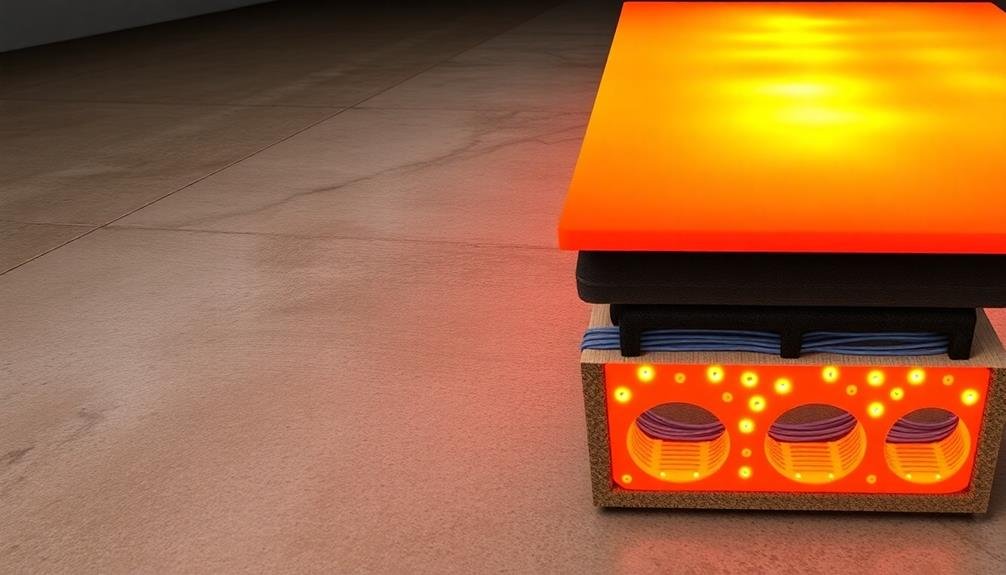
A powerhouse in construction, concrete stands out as an excellent material for radiant floor heating systems. Its high thermal mass allows it to absorb and retain heat efficiently, making it ideal for maintaining consistent temperatures throughout your space.
You'll find that concrete's ability to store heat helps reduce energy consumption and costs over time.
When you opt for concrete radiant flooring, you're choosing a durable and long-lasting solution. It's resistant to wear and tear, ensuring your heating system remains effective for years to come.
Concrete's versatility also means you can customize its appearance with various finishes, colors, and textures to match your interior design preferences.
Installing radiant heating in concrete floors is straightforward, especially in new construction projects. The heating elements are typically embedded directly into the concrete slab, ensuring optimal heat distribution.
For existing homes, you can still benefit from concrete's thermal properties by adding a thin layer of concrete over your current flooring.
One potential drawback is concrete's slower heat-up time compared to other materials. However, once warmed, it excels at maintaining a comfortable temperature, making it an energy-efficient choice for your radiant floor heating system.
Engineered Hardwood
Engineered hardwood offers a compelling blend of aesthetics and practicality for radiant floor heating systems. It's constructed with multiple layers, typically featuring a high-quality wood veneer atop a plywood or high-density fiberboard core. This layered structure provides greater stability and resistance to moisture and temperature changes compared to solid hardwood.
When installing engineered hardwood over radiant heating, you'll need to verify the flooring's thickness doesn't exceed 3/4 inch to allow efficient heat transfer. Look for products specifically rated for use with radiant systems, as these are designed to withstand the thermal stress. You'll also want to maintain a consistent room temperature and relative humidity to prevent warping or gaps.
One of the key advantages of engineered hardwood is its versatility in installation methods. You can glue it down, nail it, or even use a floating installation, depending on your subfloor and preferences.
However, be sure to follow the manufacturer's guidelines for acclimation and installation to maximize performance and longevity. With proper selection and installation, engineered hardwood can provide a beautiful, durable surface that efficiently conducts heat from your radiant system.
Ceramic Tile
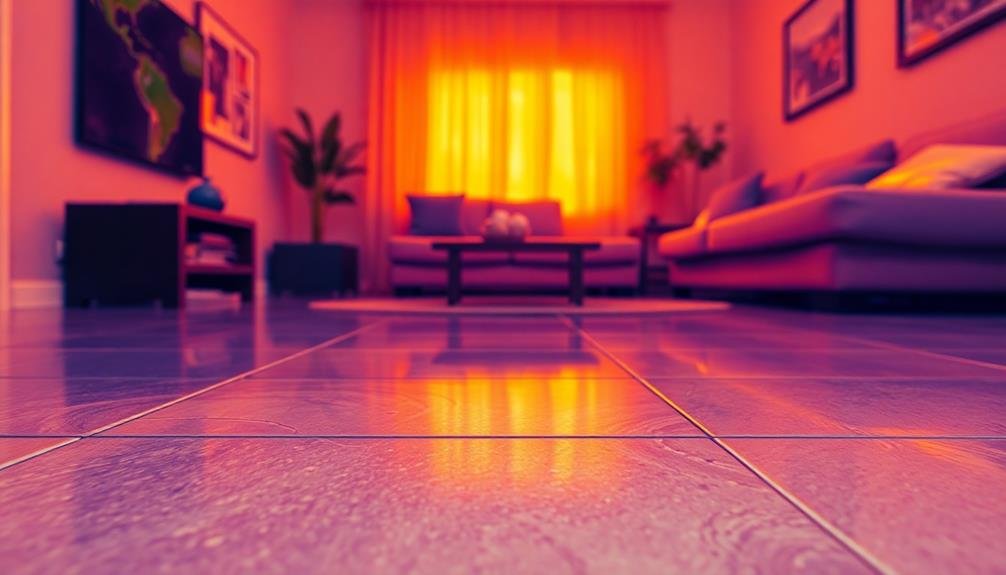
Efficiency meets elegance with ceramic tile as a top choice for radiant floor heating systems. You'll find that ceramic tile's excellent heat conductivity allows for quick and even heat distribution throughout your space. Its low thermal resistance means you'll feel the warmth faster and enjoy consistent temperatures across your floor.
Ceramic tile offers numerous benefits for radiant heating:
- Durability: It withstands heavy foot traffic and resists scratches, making it ideal for high-use areas.
- Moisture resistance: Perfect for bathrooms and kitchens, it won't warp or damage from water exposure.
- Easy maintenance: Simply sweep and mop to keep your floors clean and hygienic.
- Versatility: Available in countless colors, patterns, and sizes to suit any décor style.
When installing ceramic tile over radiant heating, guarantee proper adhesive and grout selection to accommodate thermal expansion.
You'll want to work with a professional installer experienced in radiant systems to avoid potential issues. Consider larger tiles to minimize grout lines and maximize heat transfer.
With ceramic tile, you'll enjoy the perfect blend of functionality and aesthetics, creating a warm, inviting space that's both energy-efficient and visually appealing.
Natural Stone
Natural stone frequently pairs well with radiant floor heating, offering a luxurious and timeless aesthetic. You'll find various types of stone suitable for this application, each with unique characteristics. Stone's high thermal conductivity makes it an excellent choice for efficient heat transfer from your radiant system to your living space.
When selecting natural stone for your radiant heated floors, consider factors like thickness, density, and finish. Thinner stones allow for faster heat transfer, while denser options retain heat longer. Polished finishes may feel smoother underfoot, but honed or textured surfaces offer better traction.
Here's a comparison of popular natural stone options for radiant floor heating:
| Stone Type | Heat Conductivity | Durability | Cost |
|---|---|---|---|
| Marble | High | Moderate | High |
| Granite | Medium | High | High |
| Slate | Medium | High | Medium |
| Limestone | Medium | Moderate | Medium |
| Travertine | Medium | Moderate | Medium |
Remember that natural stone requires proper sealing and maintenance to protect against moisture and stains. While it may have a higher upfront cost, its longevity and energy efficiency can make it a worthwhile investment for your radiant heating system.
Vinyl Flooring
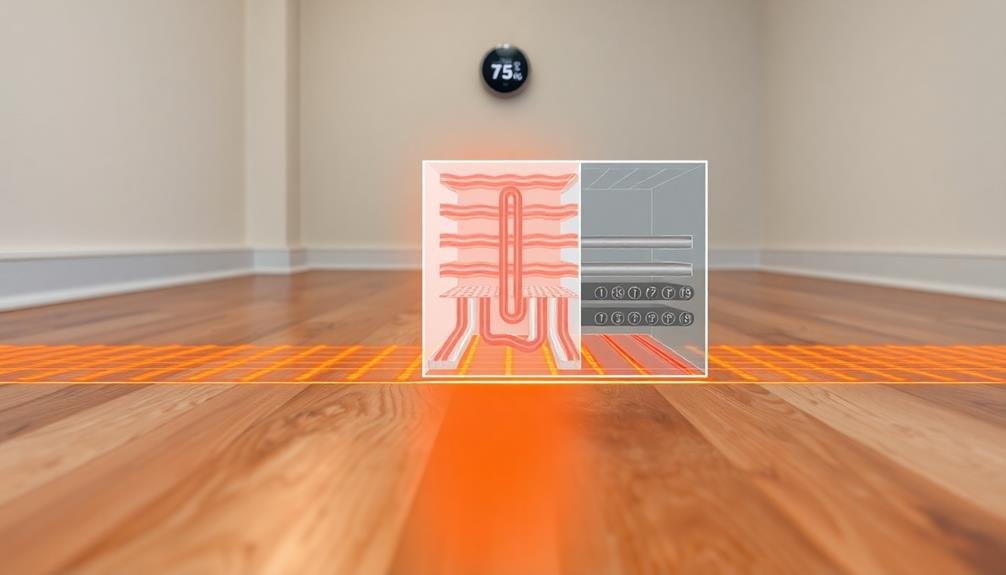
While natural stone offers elegance, vinyl flooring presents a more budget-friendly option for radiant floor heating systems. You'll find that vinyl is an excellent conductor of heat, allowing for efficient warmth distribution throughout your space.
It's also moisture-resistant, making it ideal for bathrooms and kitchens where spills are common.
When choosing vinyl flooring for your radiant heating system, consider these key points:
- Thickness: Opt for thinner vinyl planks or tiles to maximize heat transfer.
- Underlayment: Use a heat-resistant underlayment to prevent damage to the vinyl.
- Installation method: Choose a floating or glue-down installation for best results.
- Quality: Invest in high-quality vinyl to guarantee longevity and performance.
You'll appreciate vinyl's versatility in design options, allowing you to mimic the look of wood or stone at a fraction of the cost.
It's also easy to clean and maintain, which is a significant advantage for busy households.
However, be aware that some vinyl products may release volatile organic compounds (VOCs), so look for low-VOC options to guarantee better indoor air quality.
With proper installation and care, vinyl flooring can be an excellent choice for your radiant heating system.
Frequently Asked Questions
How Long Does Radiant Floor Heating Typically Last Before Needing Replacement?
You can expect your radiant floor heating to last 20-35 years before needing replacement. However, with proper maintenance and care, it's possible to extend its lifespan even further. Regular inspections and prompt repairs will help maximize longevity.
Can Radiant Floor Heating Be Installed in Existing Homes Without Major Renovations?
Yes, you can install radiant floor heating in existing homes without major renovations. You'll find electric systems are easier to retrofit, as they're thinner and don't require extensive floor height adjustments. They're perfect for specific rooms or areas.
What's the Average Cost Difference Between Radiant Floor Heating and Traditional Heating Systems?
You'll find radiant floor heating typically costs 30-50% more upfront than traditional systems. However, you'll save on energy bills long-term. It's about $6-15 per square foot, while traditional systems average $2-5 per square foot.
Are There Any Health Benefits or Concerns Associated With Radiant Floor Heating?
You'll find radiant floor heating offers several health benefits. It reduces dust circulation, improves air quality, and maintains consistent temperatures. There aren't significant health concerns, but it's important to guarantee proper installation to avoid moisture issues or overheating.
How Does Radiant Floor Heating Affect Home Resale Value and Energy Efficiency Ratings?
You'll likely see a boost in your home's resale value with radiant floor heating. It's an attractive feature for buyers and can improve your energy efficiency rating, potentially leading to lower utility costs and higher property value.
In Summary
You've now explored the top materials for radiant floor heating. Whether you're considering concrete, engineered hardwood, ceramic tile, natural stone, or vinyl flooring, each option offers unique benefits. Remember to weigh factors like heat conductivity, durability, and aesthetic appeal when making your choice. By selecting the right material, you'll guarantee peak performance from your radiant heating system while creating a comfortable and stylish living space. Don't hesitate to consult professionals for personalized advice.

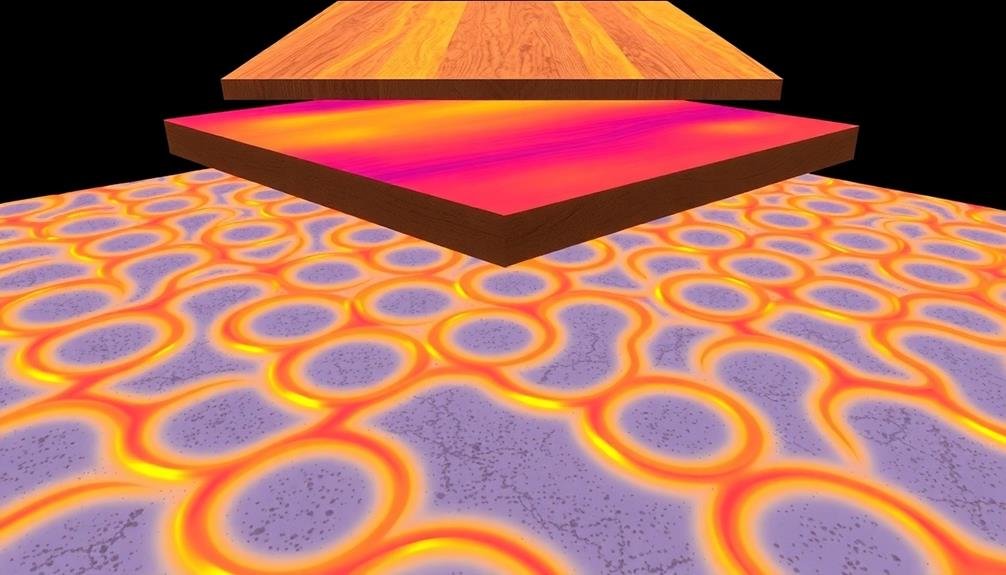

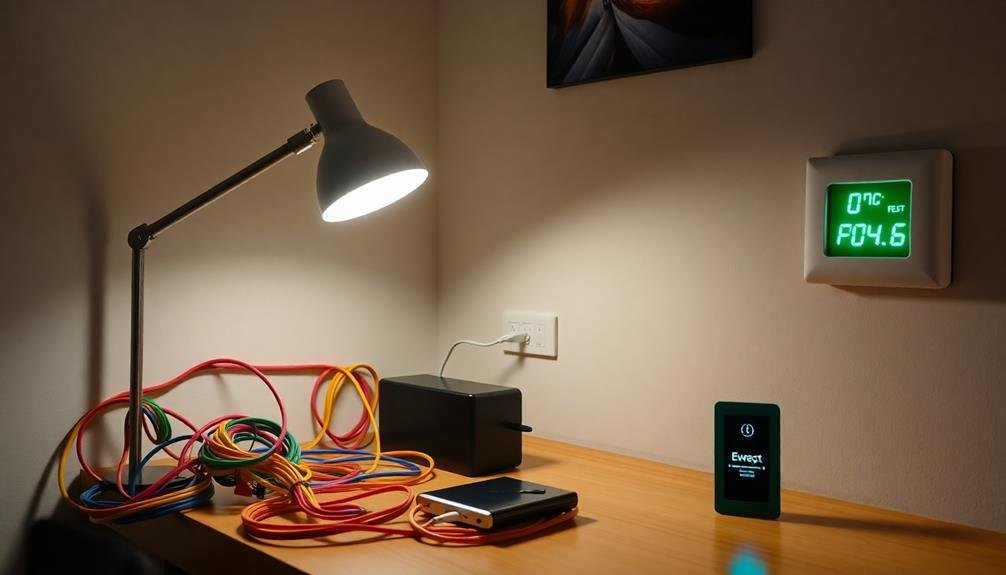
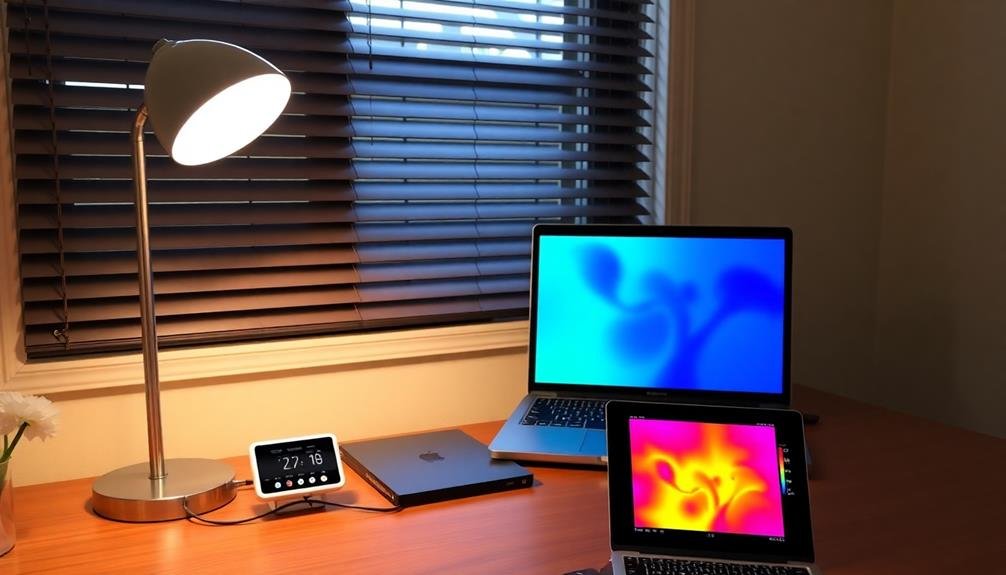
Leave a Reply